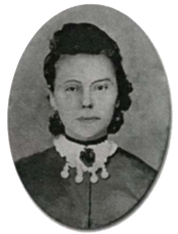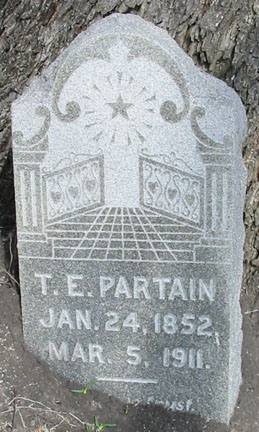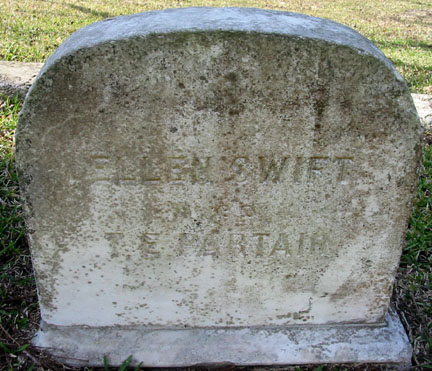|
||
|
Her father was Arthur Swift (December 17, 1810 Hanover? County, Virginia – 1855 Seguin, Guadalupe County, Texas). He was one of the three founders of the town of Seguin--the others being Matthew Caldwell and Jim Campbell. He was also the founder of the First Baptist Church of Seguin. Arthur married Margaret Mackey Baker (July 20, 1828 Maury County, Tennessee – c1853 Seguin, Guadalupe County, Texas). Margaret was the daughter of James McCulloch Baker (1797-1882) and Martha Jane Smith Baker (1803-1850). James Baker was one of the founding fathers of DeWitt County. He, with his friend James Norman Smith, founded the First Presbyterian Church in what is now DeWitt County. Baker was elected Chief Justice of Gonzales County in 1844 and in 1846 was the first chief justice of Dewitt County, State of Texas. He was the first probate judge of DeWitt County and served as county judge 1850-1852 and 1865-1867.
Arthur and Margaret had four daughters: Arthur’s wife, Margaret, died c 1853 and he married second Philadelphia Wheeler Borden c Feb 1855. Philadelphia was the daughter of Gail Borden. Family tradition says that Arthur and Philadelphia had a month-long honeymoon. When they returned from their trip, Arthur was struck with fever and died ten days later. He is believed to be buried in Vaughan Cemetery in Seguin. In 1860, Arthur’s oldest three daughters, Mary, Margaret and Martha, were living in DeWitt County with their mother’s father, James McCulloch Baker. The fourth daughter, Eleanor “Ellen” was living with her mother’s sister, Nancy Ann Baker Howard Pincham in Plum Creek, Caldwell County, Texas. In 1870, seventeen-year-old Ellen was still living with her aunt Nancy. |
||
|
Nancy and Thomas had one son, James E. “Jimmy” Partain (December 1, 1875-August 11, 1900) who died in a tragic accident. Jimmy Partain Drowned. It falls to the lot of THE TRIBUNE to record another very sad and tragic drowning this week, that cut off James E. Partain in the very flower of his young manhood. Jimmy, as he was affectionately called by his large circle of intimate friends had been to El Campo last Saturday with his father, T. E. Partain, on business. They left El Campo about 4’oclock in the afternoon, and as the distance they had to travel was some thirty miles, it was nearly ten o’clock Saturday night when they reached Deming’s Bridge which spans the Trespalacios near Hawley. Mr. Partain has a private bridge over the Trespalacios on his ranch, some two miles above Deming’s bridge; but as the creek was rising very rapidly when they departed in the morning they thought it too far to go down to the higher and large bridge. After they had gotten upon the bridge they could see that the water was running around the east end of it and was apparently deep and very swift current, and Mr. Partain remarked that he thought they had better turn back and seek shelter with a neighbor until morning. But Jimmy was anxious to go home and insisted that they proceed, expressing confidence in their ability to make the passage in safety. As his son was the less robust of the two, Mr. Partain took the lead, )they were on horseback), …in his wake. On reaching the shore Mr. Partain halted and turned to look after his son, but was startled to see nothing of him. Failing to get an answer when he called Jimmy, Mr. Partain spurred his horse back into the water and soon found his son’s horse entangled in the brush and riderless but still alive and struggling. In his desperate struggle to discover and rescue his drowning boy, Mr. Partain very narrowly escaped drowning himself. Hastening to the nearest house, Mr. Partain procured assistance and hurriedly returned, finding the horse still entangled in the brush but now lifeless. All night and all of the next two days the stream was dragged and searched by kind neighbors who gathered from far and near to assist and sympathize with the heart-breaking father and mother of a gentle, winsome, loveable son, their only child. But not until ____ morning did the angry waters give up their victim. By the process of __ture the body rose to the surface some 50 or 75 yards below where the accident happened. With tender, loving arms and ___ hearts and overflowing eyes, all ____ mortal of Jimmy Partain was laid in the tomb for the long, peaceful sleep that shall know no waking till the day of the resurrection morn, when there will be a happy reunion with ___ ____ and other loved ones in the ____ realm of eternal bliss. May the father and mother, looking up ____ ____ tears, catch a glimpse of ___ ___ meeting over yonder, and ____ reconciliation and happy _____ God’s “fullness of time.” This account was in the remembrances of Frederick Caspar Cornelius. His daughter, Julia, was to marry Jimmy a few days after he was drowned.
About the 12th day another occurrence took place, which put gloom
over the entire community. I do not mention this because I wish to
tear open old wounds, but as I said before, Julia was thinking of
getting married. This was the fatal day on which Jimmie Partain, to
whom Julia was engaged to be married in a few days, drowned. Jimmie
was, in his days, the most refined and loveliest character I ever
knew, and the only child of Mr. and Mrs. T. E. Partain. I never
shall forget the day in all my life, when G. B. Garnett, an old
friend of mine, came opposite my house (the Juanita Creek was way
over the banks so he could not get to my house) and told us the news
of the fatal accident. It almost killed Julia and I took her around
by Deming's bridge, the place where he was drowned, to the house of
his father. After that Julia never lived with me any more, but God
may forgive her as I have long ago. Afterwards she married a young
man, H. P. Taylor, who is now living in New Mexico. |
||
|
The marriage evidently didn’t last long as Ellen married Pinkerton detective and author Charles “Charlie” Siringo (1855-1926) on May 24, 1913 in Hot Springs, Arkansas. They moved to Siringo’s Sunny Slope ranch in New Mexico, but reportedly, it was not to Ellen’s liking and they were divorced in October 1911. In June 1914, Ellen married Emory Eron Sapp (1878-1963) in Beaumont, TX. She died November 7, 1914 in Liberty County, Texas while on a hunting trip with her husband and friends, Mrs. Taylor, Dick Watts and Frank Havard. The shooting was reported to be accidental while Dick Watson was cleaning a shotgun. The story was initially reported in the Galveston Daily News. |
||
The Galveston Daily News, Monday, November 9, 1914 |
||
|
||
|
|
||
|
|




